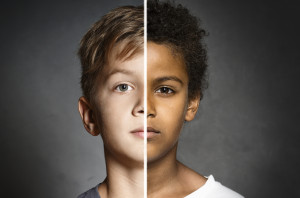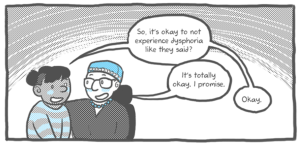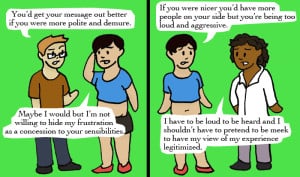
Wads of twenty dollar bills fastened with rubber bands.
We all know that the Internet can be an awful, awful place. We’re constantly admonished not to read the comments.
But sometimes you can’t help yourself.
So you wade into the comment section of some article about housing discrimination or microaggressions from management at a place of business, when you encounter something like this: “Oh c’mon! They’re not gonna turn away business just to ‘oppress’ someone. They need to make money!”
Perhaps you’ve even been that commenter, on some level.
And it makes total sense, in a classist society, that one would believe this sentiment. Because it is true that capitalism is intrinsically oppressive on its own.
We’ve seen its negative and unethical effects enough times to believe that all businesses care about is their bottom line.
Capitalism’s focus on competition supposedly allows for anyone with “a dollar and a dream” to start a business and find ways to make that business successful – and in capitalist terms, that means to increase profits.
But the focus on profit has produced many of the inequalities that we see today, such as low, stagnant wages for workers; significant income gaps between the wealthiest and poorest in our nation and world; environmental crime; slave labor in the Global South; and much more.
Moreover, by its nature, it inherently creates an economic stratification that favors those with greater wealth. We call that classism.
Some, like that example of a commenter, would argue that because of this, “the only color that matters is green” – the belief that the desire to profit, from any venture, trumps any other bias that an individual or system might have. What matters, supposedly, is the bottom line.
But the need for individuals and companies to make money – the heart of capitalism – doesn’t necessarily protect those of us with other marginalized identities (race, sexual orientation, citizenship status, religious minorities, gender, and so on) from being excluded or discriminated against.
The belief that only money matters – and, therefore, individuals or companies wouldn’t jeopardize profits to shut social minorities out of opportunities and access – erases the oppressive experiences that racialized, gendered, and other marginalized people experience due to our identities.
We need to remember to think about the intersectionality of oppression – and how all forms of it work together to uphold the status quo.
Intersectionality recognizes the totality of who we are. A person doesn’t only experience oppression in one way (in this case, classism); their various identities intersect to influence how they’re treated by society and, in turn, how they experience the world.
With that in mind, here are just a few points that we can use to begin to think differently about the ways that capitalism and other forms of oppression collide – and the ways that they don’t.
1. Inherent Bias Isn’t Logical
You may be familiar with common expressions of beliefs such as “My child can have X friends, but I have a problem if they want to date them” or “Hey, I watch porn – it’s great – but if I ever had a daughter who did that stuff…”
They illustrate respect and acceptance of difference and disgust and disapproval all in the same breath.
Another classic example of this inconsistency in beliefs is the history of race, housing, and loans.
A Black couple goes to buy a house or take out a loan. The typical argument would be that their skin color doesn’t matter, so long as they have the money to pay for these things. The person selling to them and the company they work for, the argument goes, just want to make money and get their commission.
However, it’s well–documented that Black people tend to be denied these things routinely compared to our white counterparts.
Moreover, it’s not just the individual loan officers or real estate agents that have bias, but it’s systemically inherent to companies’ overarching policies. That is, racism is naturally inserted into the way companies operate.
This is happens whether it is done purposely or not because we live in a deeply racist society, due to centuries of oppression, discrimination, and bias.
But the idea that the only thing that matters is profit is rooted, ultimately, in logical thinking: If a person wants to make as large a profit as possible, they don’t have the luxury of excluding or denying groups of people.
However, history has shown time and time again that, generally speaking, bias and bigotry simply don’t make any real sense:
Immigrants, particularly those of color, are simultaneously stereotyped as lazy and “stealing our jobs” is an ever-popular sentiment that xenophobic people use. Latinas are simultaneously assumed to be traditionally feminine, as well as loud or outspoken. Latino men, on the other hand, are simultaneously stereotyped as suave and appealing and sexually dangerous. These harmful stereotypes are not new, but persist to this day.
A person’s ideology often supersedes what most people would agree is logical.
This centuries-old tendency is just as true when we consider how various oppressions intersect.
When we begin to move away from the idea that bigoted people will of course do what makes sense, we can see how prejudices can easily seep into even money-oriented decision-making.
2. Catering to the Majority = Profit
Remember the “religious freedom law” controversy in Indiana in 2015?
After co-owner Crystal O’Connor spoke out about her religious right to deny services to queer and trans potential customers, her pizzeria, Memories Pizza, was supported through crowdfunding when it was threatened with closure.
They raised well over $800,000.
Chick-fil-A is another notorious example, as a company that is openly and proudly anti-LGBTQIA+.
Although NYC Mayor Bill de Blasio recently implored his constituents to boycott the company for this very reason, the fact of the matter is that the company continues to expand, despite its bigoted culture anchored by the leadership of its CEO, Dan Cathy.
If ideology often defies logic, then it makes sense that a person, company, or institution must find other ways to maximize profit if they’re to uphold their deeply rooted beliefs while also making money.
The good news for them is that there are many potential sources of profit when you cater to the majority.
While there are many people with privilege, of various kinds, who believe in and practice social justice – people who might boycott or speak out against oppressive practices in solidarity with marginalized groups – the truth is that a business that prefers to cater to people who hold social privilege will always have potential customers.
That’s because while some are more than happy to support an organization or company that aligns with their own personal beliefs, most people are simply apathetic and unconcerned with where they spend their money.
This means that a company can rely on a guaranteed source of profit without reaching out to marginalized communities.
And if it can do that, this means that it can indeed lock those it is bigoted against, consciously or not, out of access, inclusion, and opportunity without jeopardizing its bottom line.
While they may not be able to make as much money as they could if they were inclusive, remember that bias is not logical.
Moreover, in most cases, they can exclude or casually ignore large swaths of people and still make record profits.
And, as Memories Pizza proves, it’s not only mega corporations that benefit from this. Even small “mom-and-pop” businesses can take advantage of this social reality – without the investors, lawyers, or stashed cash to back themselves up.
This is social privilege in action.
3. Sometimes We Don’t Have a Choice
Fear not! Just because some companies, banking institutions, and organizations won’t serve you in meaningful ways, that doesn’t mean they don’t have other ways to take your money!
One of the best examples of this is airlines and the Transportation Security Administration (TSA). While racial profiling is certainly nothing new, we saw a disgusting rise in its usage post-9/11.
People who are or are perceived to be Arab, South Asian, or Muslim (including Sikhs and Hindus who are mistaken) are routinely singled out at airports for security checks.
This is a humiliating, angering, and painful experience. And while most individual TSA agents probably don’t deliberately seek to cause harm, that is exactly what they do.
Now, you’re probably reading this and wondering what this has to do with making money.
Well, airlines, like any other company, exist to turn a profit. Capitalism, combined with institutionalized oppression (in this case, operating in conjunction with the federal government), seeks to maximize profits while still upholding the status quo.
“So go ahead, spend money buying our tickets, religious minority person of color. We’ll give you a hard time, delay you, and even become a stressor that can contribute to long-term mental health issues, but you’ll still utilize our services – because what other choice do you have?”
Capitalism is very good at finding ways to siphon money from the oppressed. In this case they’re saying, “We can still make money without catering to you!”
You see, “catering to” and “serving” a population isn’t just the simple act of providing services.
It means that, when served, we are treated with a sense of dignity. We are treated like we, too, are human beings worthy of respect.
There are many companies that technically serve, for example, people of color; LGBTQIA+ folks, and women and non-binary people, but do so in a way that undermines our humanity.
Like oppression in general, sometimes the subpar goods and services are overt; other times, they’re very subtle.
Often, these companies have no fear of any sizeable repercussions because we rely on many of them for our day-to-day activities.
In some cases, these companies are our only choice. Depending on where we live and the resources we have access to, there can be a dearth of options for certain services.
Therefore, they can continue to engage in oppressive practices while taking money from the very people that they despise.
Consciously or not, when you don’t want to see marginalized people prosper (or want to see them suffer), it’s easier to create barriers to success and sources of stress than to provide them with the tools and opportunities they need.
You can delay services, redirect to more expensive or difficult ways of doing things, all while holding to your principles – and still making money.
***
Discrimination and bias aren’t always consciously deliberate, but they have far-reaching devastating effects.
They perpetuate invisibility, create stressors, and can make it more difficult for marginalized people to become successful in a capitalist society that necessitates financial security.
When you are multiply marginalized, intersectionality reveals that the ways and frequency with which we experience these oppressions are magnified.
The more we recognize the ways that oppression manifests, the better equipped we’ll be to name and fight against it.
[do_widget id=’text-101′]
Denarii (rhymes with “canary”) Monroe is an aspiring screenwriter, freelance writer, and a weirdo. She’s a Rutgers University alum and has written for BlogHer, Black Girl Dangerous, and is a current regular contributor for Ravishly. She loves Buffy the Vampire Slayer, as well as soul food, red wine, cooking and baking, and the blues. Hanson is her favorite band ever (yes, *that* Hanson). Follow her on Facebook, Twitter, and Instagram.
Search our 3000+ articles!
Read our articles about:
Our online racial justice training
Used by hundreds of universities, non-profits, and businesses.
Click to learn more




















